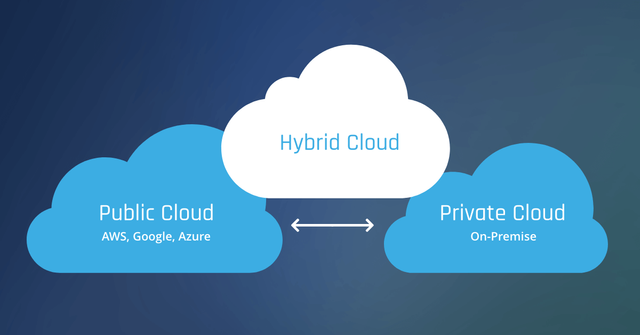
Organizations are turning to hybrid cloud solutions to tackle complex challenges. Combining the power of on-premise infrastructure with cloud-based resources offers enhanced flexibility, scalability, and security.
But what sets hybrid clouds apart is their ability to blend symbolic logic with deep learning. By merging these two powerful technologies, businesses can unlock new ways to process and analyze data.
According to Statista, the hybrid cloud market is expected to reach $262 billion by 2027, with the Asia-Pacific region contributing the largest share.
Hybrid Cloud Solutions: The Perfect Balance
Businesses are increasingly turning to hybrid cloud solutions to handle their data more efficiently. By combining private and public cloud environments, they can store sensitive data securely in private clouds while using the public cloud for other, less sensitive applications.
This flexibility allows businesses to manage their data according to their needs and regulatory requirements.
This balance doesn’t just stop with infrastructure. It also extends to the way these clouds handle computing tasks, which brings us to the role of symbolic logic and deep learning.
These two technologies work together to improve data processing, making tasks more efficient and intelligent.
Symbolic Logic Meets Deep Learning
Symbolic logic has been around for decades and has been a foundational element in computer science. It focuses on reasoning, where facts and knowledge are represented in the form of symbols. These symbols help machines understand relationships, infer conclusions, and solve problems step by step.
On the other hand, deep learning is a subset of artificial intelligence that uses neural networks to mimic the way humans learn. It enables machines to recognize patterns, make predictions, and even make decisions based on large datasets.
Combining symbolic logic with deep learning brings out the best of both worlds. Symbolic logic helps provide structure and clarity to data, while deep learning brings the ability to learn and adapt. Together, they create systems that can reason about data, make smarter decisions, and improve over time.
Enable Smarter Systems
The hybrid cloud environment enhances this combination of symbolic logic and deep learning. By using hybrid cloud solutions, businesses can scale up their computing power as needed.
The cloud’s flexibility allows for the processing of vast amounts of data, which deep learning algorithms require to improve their accuracy.
Moreover, symbolic logic can help organize and refine the data in a way that deep learning algorithms can process it more effectively.
This leads to smarter systems that can make better, faster decisions.
Whether it’s for predictive maintenance, customer service automation, or even supply chain optimization, hybrid cloud solutions can handle these tasks more efficiently by using symbolic logic and deep learning together.
Enhancing Data Security with Hybrid Clouds
Security remains one of the top concerns when using cloud-based technologies. Fortunately, hybrid clouds offer solutions that cater to the need for both security and scalability.
By keeping critical data within private clouds, businesses can ensure that their most sensitive information stays protected.
Meanwhile, they can use the public cloud for tasks that require more flexibility and less security.
Combining symbolic logic with deep learning in hybrid cloud systems can also enhance security.
For example, deep learning algorithms can be used to detect anomalies in data, while symbolic logic can help categorize and prioritize the threats based on their potential impact. This two-pronged approach allows for quicker and more accurate responses to security threats.
Real-Time Data Processing
Hybrid clouds offer the advantage of processing data in real time. This is particularly beneficial for businesses that need instant insights to make critical decisions.
By combining symbolic logic with deep learning, businesses can analyze data in real time and make decisions based on up-to-date information.
For example, in industries like healthcare, this ability can help in diagnosing conditions faster, predicting patient outcomes, or even managing inventory in real time.
The ability to process data instantly, using hybrid solutions, makes these tasks not only possible but efficient as well.
Cost-Effectiveness
Adopting hybrid solutions doesn’t just improve performance and security; it also brings significant cost benefits. By using both public and private clouds, businesses can reduce their operational costs.
They only need to invest in private cloud infrastructure for sensitive tasks and use the public cloud for scaling up as needed.
With symbolic logic and deep learning integrated into this setup, businesses can achieve even greater savings. These technologies can optimize workflows, automate processes, and enhance decision-making, all of which can cut down on costs in the long run.
The flexibility of hybrid clouds ensures that businesses pay only for the resources they use, making it a highly cost-effective solution.
Looking Ahead with Hybrid Cloud Solutions
Cloud solutions will play a critical role in driving innovation. Combining symbolic logic with deep learning opens the door for more intelligent, adaptive systems that can make complex decisions faster and more accurately than ever before.
Businesses will be able to leverage these technologies to gain deeper insights into their data, improve efficiency, and stay ahead of the competition.
The fusion of symbolic logic and deep learning also offers the potential to create more personalized experiences for customers. For instance, in e-commerce, hybrid clouds can help analyze consumer behavior in real time, while symbolic logic can guide decision-making based on that data. This results in more tailored recommendations and better customer satisfaction.
Conclusion
Hybrid cloud solutions are more than just a way to store and manage data; they are a game-changer when it comes to combining symbolic logic and deep learning. By enabling organizations to scale computing power, ensure data security, and process information in real time, hybrid clouds enhance the capabilities of both technologies.
As businesses continue to adopt these solutions, they will not only be able to work smarter but also faster, more efficiently, and cost-effectively.